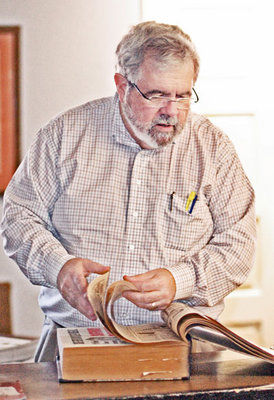
Pulitzer Prize-winning investigative journalist David Cay Johnston visited the Press-Banner office last week to talk about his new book and look through the archives for his byline from his first serious job in the news industry.
Johnston, a lecturer at Syracuse University School of Law and until recently a financial columnist for Reuters, visited one of the newspapers where he started his career in 1967. He was on his way to a 45-year class reunion for Soquel High School.
Johnston’s rise in the world of journalism moved quickly.
At 18 years old, Johnston, now 63, got a job at the Valley Press in Felton. He worked as a reporter-photographer, covering business, car crashes and the like and “learning how to do it,” he said.
In 1968, he took a position at the San Jose Mercury and, after some schooling, rose quickly through jobs at the Detroit Free Press, the Los Angeles Times and the Philadelphia Enquirer before joining the New York Times as a tax reporter from 1995 to 2008.
But a chapter in his latest book brought things home for him.
In the book, titled “The Fine Print: How Big Companies Use ‘Plain English’ to Rob You Blind,” Johnston wrote an entire chapter on how the people of Felton fought the publicly traded German company American Water Works, and its local subsidiary California American Water Co., to purchase the water system in town — but at a steep price.
Johnston’s research found that when Citizen’s Utilities bought the system, privatizing it in 1961, they paid about $1,785 per customer in today’s money. American Water then paid about $1,540 per customer to purchase the system in 2002. With water rates on the rise under the new ownership, Felton residents fought to purchase the system from American Water and wound up buying it for $13 million — which equals almost $10,000 per customer.
“The Felton chapter works because I had real people,” Johnston said.
He became interested in the Felton water fight when he came across a piece in the Los Angeles Times that explained it. He talked with the people involved, including local residents Connie Barr, Jim Graham and Jim Mosher, who helped form Felton Friends of Locally Owned Water, a grassroots group that fought for public ownership of the water system.
Johnston explains in the chapter, titled “Draining Pockets,” how corporate ownership of a water system results in higher rates and gives little opportunity for citizens to protest rate increases, because of the power of corporate lawyers who manipulate laws so corporations profit.
That’s generally a theme of “The Fine Print,” Johnston said.
“It’s a fundamental mistake that we’ve made,” Johnston said, “allowing big business to get laws rewritten for their benefit and with zero regard for balance in the economy.”
Johnston said a solution is to force large corporations to set aside $1 for every dollar they spend in legal cases on utility rates and then make that money available for customers to protest rate increases and such.
“If you don’t put up money for people to advocate for customers, then you get one-sided regulation,” Johnston said. “I want to see competitive markets, economic growth. I don’t want to see big corporations use political capital to take away consumer rights.”
“The Fine Print” is the third book in a series in which Johnston promotes competitive markets. Johnston’s other titles are “Perfectly Legal” and “Free Lunch.”
To comment, email editor Peter Burke at pe***@*********er.com, call 438-2500 or post a comment at www.pressbanner.com.












